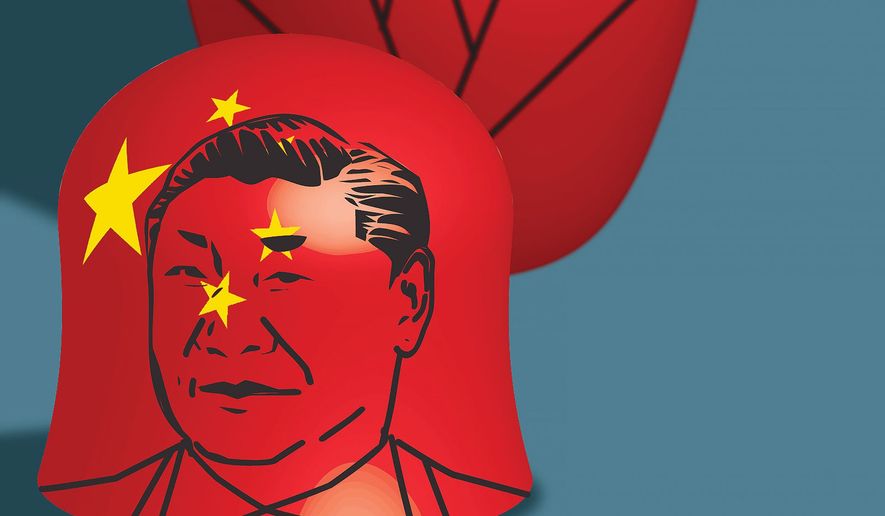Joseph R. DeTrani
OPINION:
 Although bilateral trade with China in 2022 increased to a record $690.6 billion, bilateral relations deteriorated to their lowest level since the normalization of relations in 1979. One could argue that we’ve entered a Cold War with China.
Although bilateral trade with China in 2022 increased to a record $690.6 billion, bilateral relations deteriorated to their lowest level since the normalization of relations in 1979. One could argue that we’ve entered a Cold War with China.Chinese military aircraft continue to violate Taiwan’s Air Defense Identification Zone, with the recent incursion of 21 J-10 and J-16 warplanes and four Chinese naval vessels dangerously close to Taiwan’s coast. Secretary of State Antony Blinken’s cancellation of his visit to China due to the incursion of a Chinese surveillance balloon shot down after flying over the U.S. for several days and China’s unwillingness to apologize or answer the phone when Secretary of Defense Lloyd Austin tried to reach his Chinese counterpart, Wei Fenghe, have contributed to even greater distrust between the U.S. and China.
China’s continued support of Russia in its war with Ukraine and reported intelligence indicating that China was considering the provision of weapons to Russia, despite China’s 12-point peace proposal — which neglected to address that it was Russia that invaded Ukraine and previously seized Crimea and other territories in eastern Ukraine with no mention of reconstruction aid to a devastated Ukraine — have put more of a spotlight on China and its true intentions in support of Russia’s war in Ukraine. Indeed, these developments and the recent state visit to China of Belorussian President Alexander Lukashenko, an ally of Russian President Vladimir Putin, have contributed to deep distrust in the U.S. and NATO as to China’s true intentions.
At the recent Group of 20 conference in New Delhi, China’s foreign minister, Qin Gang, and his Russian counterpart, Sergey Lavrov, opposed two paragraphs in a proposed consensus communique. Interestingly, the second paragraph of the communique that China objected to did not mention Russia or Ukraine; it cited the United Nations principles on international humanitarian law, “including the protection of civilians and infrastructure in armed conflicts” and forbidding “the use or threat of nuclear weapons.”
These and other issues with China — the suppression of Uighurs in Xinjiang, the national security law imposed on Hong Kong, the militarization of islands and reefs in the South China Sea, assertiveness in waters surrounding the Senkaku Islands, the theft of intellectual property and civil-military fusion — have contributed to an exponential downturn in U.S.-China relations.
The U.S. response has been powerful. Huawei Technologies was placed on a trade blacklist in 2019, restricting most U.S. suppliers from shipping goods and technology to Huawei while tightening controls to restrict Huawei’s ability to buy or design semiconductor chips that are used in most of its products. The House Foreign Affairs Committee’s recent decision to effectively ban TikTok on all mobile devices in the United States is another action taken by the U.S. to address China’s efforts to spy on Americans. The Commerce Department last week targeted 28 Chinese firms and individuals that represent potential national security risks. There likely will be more primary and secondary sanctions imposed on Chinese entities that deal directly or through third parties with sanctioned entities in Russia, Iran and North Korea.
Last week, the House Select Committee on Strategic Competition between the U.S. and the Chinese Communist Party convened its first open meeting to do deep dives into economic and security competition with the CCP.
All this comes at a time when China, on March 5, convened its annual National People’s Congress — its rubber-stamp national legislature that will endorse decisions taken at the October 2022 Chinese Communist Party Congress: securing a third term for Xi Jinping as president, appointing Li Qiang premier and other party officials loyal to Mr. Xi to the State Council, China’s Cabinet. And on its first day, Premier Li Keqiang laid out China’s economic priorities and a new budget in a government work report that included plans for more defense spending, with this year’s economic growth target at “around 5%.”
And as Mr. Xi starts his third term as president, there are numerous media reports that he and senior Chinese officials have agreed to give the CCP more direct command in sectors dealing with security, finance, technology and culture — indeed, establishing a more centralized governance system, with the CCP in the lead.
Since Mr. Xi abruptly ended China’s zero-COVID policy in December, he has been in a race to repair China’s ailing economy and restore good relations with the international community. Vice Premier Liu He’s upbeat presentation at the Davos 2023 conference was well received, with the goal of encouraging more foreign direct investment in China. State Councilor and Politburo member Wang Yi’s February visits to and meetings with the leadership in Paris, Italy, Hungary, Russia and Germany (for the Munich Security Conference) was part of China’s initial diplomatic offensive to restore the credibility it lost with its support of Russia’s invasion of Ukraine.
No comments:
Post a Comment